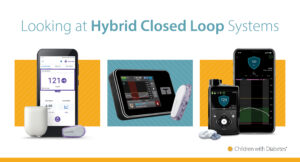CWD News
Feelings of Guilt among Parents of Children Living with Diabetes: Unshackling the Chains
Type 1 diabetes is a life-changing diagnosis for both children and their parents. Many parents experience feelings of guilt around the time of diagnosis as well as thereafter. Although this feeling is common, understanding guilt and how it influences parenting can allow you to decide if and how you might want guilt to play a role in your life. Guilt versus Other Emotions Many parents experience a lot of challenging emotions related to their children’s diabetes like grief, frustration, anger, and sadness. When any negative parent emotions linger and fester over time, they don’t only cause discomfort for the parent, […]
Read MoreTogether We Can Reduce Diabetes Stigma
There are many common misconceptions about diabetes, which can lead to people feeling stigmatized, or treated in a way that makes them feel “less than” others. As discussed in, Yes, I can eat that: Answering Diabetes Questions, it seems that we as PWD (People with Diabetes) are subjected to more questions about our choices than people without diabetes. Part of the reason that people feel they can ask us these questions is due to the cultural stigmas around diabetes. Diabetes Stigma Defined It’s a popular belief that diabetes is caused by lifestyle behaviors such as lack of exercise or eating […]
Read MoreCWD-JENIOUS Award: Supporting Diabetes Research
Children with Diabetes has collaborated with the International Society for Pediatric and Adolescent Diabetes (ISPAD) for over 20 years. This collaboration has recently led to developing a partnership to help foster the relationship between diabetes researchers and people living with diabetes and their families. As a part of this partnership, the CWD-JENIOUS Award was created to allow one young researcher from ISPAD to attend CWD’s Friends for Life (FFL) conference in Orlando. The ISPAD JENIOUS group is the “Juniors in Educational Networking and International Research Opportunities: United States,” designed for young researchers who are starting to embark on their careers. […]
Read MoreCOVID Viruses, Vaccines, and T1D
Although we do not know the cause of type 1 diabetes, scientists believe that there is an environmental trigger that kick-starts the autoimmune process. When the body has the added stress of something like a virus, for example, it may cause the body to start attacking itself. For type 1 diabetes, the islet cells are the target of the body’s autoimmune attack. Viruses and Auto Immunity Recent data was presented at the European Association for the Study of Diabetes conference in September 2022 that showed people who had recently been diagnosed with type 1 diabetes were more likely to have […]
Read MoreCWD Attends the European Association for the Study of Diabetes Conference in Stockholm
The European Association for the Study of Diabetes gathered in Stockholm, Sweden September 19-23 and Children with Diabetes’s founder and president, Jeff Hitchcock, and Clinical Director Marissa Town, attended and participated in a variety of events. Here’s a quick peek at what CWD did throughout the EASD meeting. Tuesday As part of the #DeDoc° symposium, Jeff Hitchcock shared with EASD attendees how CWD pivoted during Covid to keep families and people with diabetes connected virtually during Covid. From the first virtual Friends for Life to Screenside Chats, more educational content, and opportunities to connect virtually helped bridge the gap throughout […]
Read MoreWhy We Rotate Insulin Injections
Insulin is life for those of us living with T1D and many of those with other types of diabetes. There are many nuances to taking insulin, including the importance of rotating where insulin is injected into the body. When insulin is injected repeatedly in the same part of the body, it can cause changes in the skin that make insulin absorb erratically. Here’s some more information to help you avoid unnecessary challenges with managing blood sugars. Lipodystrophy Anyone who took Latin or medical terminology classes, this will be a little easier for you! For the rest of us, we’ll break […]
Read MoreLooking at Hybrid Closed Loop Systems
Diabetes technologies are changing quickly, so we at CWD want to make sure you have the up-to-date information on what’s available to you in the U.S. For your reference and to help with any decisions you may need to make, we put together this chart of the current hybrid closed-loop systems for people with diabetes, as well as some helpful information about closed-loop systems. Some Quick Definitions: Basal – Background insulin Bolus – insulin taken for food or correcting a higher than target blood glucose CGM – Continuous Glucose Monitor Open Loop – when the pump is operating independently of […]
Read MoreTaking Diabetes Back to School
Kids often say things such as, “I never get to do (insert something that they probably actually get to do all the time)” and may even ask the adults in their life why they are not allowed to do certain things. But if your child has diabetes, and they are being told “no” by someone at school to treating a blood sugar, this is a huge problem. Luckily, there are protections in place in the U.S. to keep children with diabetes safe in schools. The Americans with Disabilities Act of 1990 is a law that helps prevent people with disabilities […]
Read MoreTraveling with Diabetes
Diabetes shouldn’t get in the way of living the life you want to live, and traveling is no exception. There are some important tips and tricks that can help keep you safe while traveling and ensure that you are able to enjoy your journey. Planning Ahead This is really the biggest piece, and although you may not be someone who enjoys planning, with diabetes in the mix, the extra planning can really make a big difference. How far you are traveling can also play into your preparation, as well as how close you will be to medical facility or medical […]
Read MoreDiabetes Distress
We often talk about how diabetes can be overwhelming, and there are some different terms that can help identify exactly how diabetes is impacting someone’s mental health. Some people experience depression with diabetes, others experience diabetes distress, and some experience full on diabetes burnout. Identifying what type of mental health issue is present is crucial to be able to receive the appropriate treatment. What is Diabetes Distress? Diabetes distress is a term that describes the negative emotional burdens associated with living with diabetes.1 This includes worries or fears that people with diabetes have, such as anxieties about high or low […]
Read More









